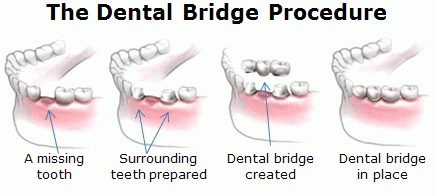Call: (301) 905-9717
Request AppointmentBridge
Bridge
Would you like to chew comfortably and have a confident smile?
Is that you? Call us now!

Since a tooth is lost, the other teeth adjacent and opposing the missing site, could grow into the gap. If you have a missing tooth or more, as the case may be, this could lead to a range of problems. First, the gap left behind is likely to affect your ability to chew properly and could even alter the way you speak. Over time, the teeth on either side of the resulting space may migrate, causing an imbalance in the amount of force you exert when you chew. In turn, this could place you at greater risk of developing TMJ, which may require extensive treatment. This could also compromise the esthetics and your mouth and could cause occlusal (bite) problems.
Aside from the health-related aspects, missing teeth tend to have an emotional impact as well. They could change the appearance of your facial features. At the same time, others have a way of noticing a physical gap in someone's teeth more so than the intent behind the smile itself. The mental and physical impacts of being forced to refrain from eating some of your favorite foods alone are also worth consideration.
A bridge is a very good solution for replacing a lost tooth (or teeth) and is an alternative treatment to implants.
How Can I Bridge the Gap?
At the Mazza Center for Implant and Esthetic Dentistry, we offer a number of solutions for replacing missing teeth. On the extreme ends of the spectrum are partial dentures and dental implants. Like full dentures, partials rest on your gums and need to be taken out regularly for cleaning. Implants are permanent replacement teeth surgically incorporated into your jawbones. Dental bridges could be considered an effective middle ground between the two, combining the best features of both.
What Exactly is a Dental Bridge?
Traditional bridges are prosthetic devices made up of crowns and artificial teeth called pontics. The crowns fit over the natural teeth on either side of the gap caused by those you're missing; we call these abutments. This type of bridge consists of a metal frame and either porcelain or ceramic crowns and pontics. A couple other types of dental bridges exist. Though we don't use these quite as often as the traditional variety, they're more suitable in some cases.
- Maryland Bonded Bridges: These may be made of either the same materials as traditional bridges or plastic and they have metal or porcelain offshoots to be attached to surrounding natural teeth.
- Cantilever Bridges: We use these in cases where an abutment is available on only one side of the gap to be filled.
All these options require healthy teeth and jawbones for support. When you visit us for an initial consultation, we'll look at your unique circumstances to determine whether a dental bridge is the right solution for you. If so, we'll also discuss which version would best suit your needs. From there, we'll move on the next phases of the process.
How Will I Take Care of My Dental Bridge?
Maintaining your bridgework is no different than caring for your natural teeth. You'll need to brush and floss just as you normally would. Coming to us for cleanings and checkups every six months is crucial to keeping your teeth and gums healthy and ensuring no unexpected issues are developing with your dental bridge as well as other aspects of your oral well-being.
Schedule an Appointment to Find out if a Bridge is the Right Solution for You
Dental bridges are suitable for patients with diabetes, immune system deficiencies, and other medical conditions rendering them ineligible for dental implants. If you'd like more information about bridges and the process surrounding them, call us at (301) 986-0025 or fill out the form we've provided to schedule a consultation. Let us help find the best solution for your needs.

